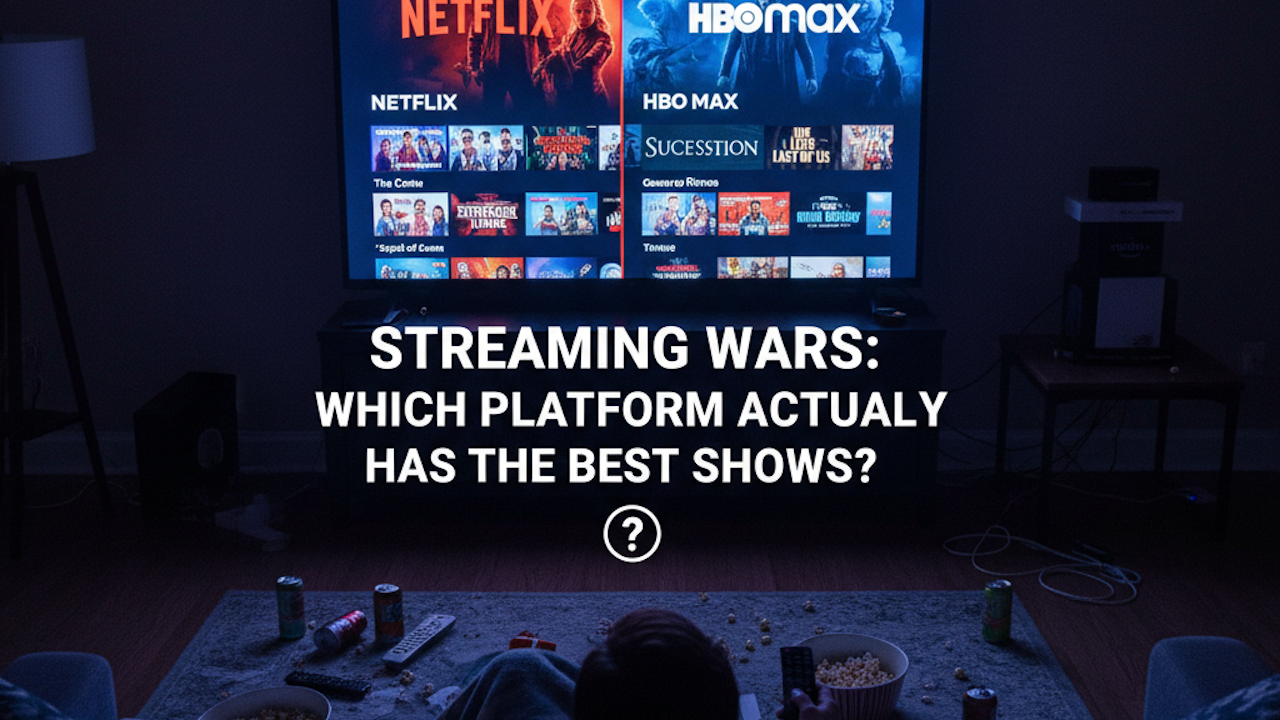The streaming wars have reshaped how we watch television. What started as a few companies experimenting with online distribution has turned into a global battle for our attention, our time, and our subscription dollars. Every platform claims to have the best original series and the most appealing libraries, but audiences only have so much money to spend and so many hours in the day. So which platform actually delivers the strongest lineup of shows?
Netflix: The Pioneer That Set the Standard
Netflix built the model that everyone else is chasing. Its early hits like House of Cards, Orange Is the New Black, and Stranger Things proved that original streaming shows could compete with cable and broadcast television. The company also expanded aggressively into international productions, bringing global audiences titles such as Money Heist from Spain and Squid Game from South Korea.
The strength of Netflix lies in its variety. The platform has prestige dramas, teen-oriented thrillers, stand-up specials, reality shows, and animated series. Yet the quantity comes with trade-offs. Netflix has developed a reputation for canceling shows after one or two seasons, frustrating loyal fans. Some argue that while Netflix has a wide range of content, its consistency is not always strong. Still, when measured by sheer volume and cultural reach, it remains the platform most likely to deliver something for everyone.
HBO Max: Prestige Above All
If Netflix emphasizes range, HBO Max emphasizes quality. HBO has long been considered the gold standard in television thanks to classics like The Sopranos, The Wire, and Game of Thrones. With HBO Max, the company continues to deliver prestige dramas and comedies that dominate awards ceremonies. Recent hits like Succession, Euphoria, and The White Lotus show that HBO still knows how to create cultural events.
HBO Max also benefits from the Warner Bros. library, meaning subscribers get access to DC shows, Friends, The Big Bang Theory, and a strong lineup of films. Unlike Netflix, HBO tends to invest more deeply in its series, often letting creators finish their stories. For viewers who value carefully crafted storytelling and high production values over sheer quantity, HBO Max makes a strong case as the best option.
Disney+: The Power of Franchises
Disney+ is built on the strength of familiar names. The platform’s catalog of Marvel, Star Wars, Pixar, and Disney classics makes it an easy choice for families and fans of blockbuster franchises. Original series like The Mandalorian, Loki, and WandaVision have proven that Disney+ can create appointment viewing, especially for fans who want to keep up with the Marvel Cinematic Universe or the expanding Star Wars galaxy.
Where Disney+ excels is brand loyalty. Parents know they will have safe options for kids, while adults can dive into nostalgia or follow the latest superhero storylines. The downside is that Disney+ lacks variety outside of its franchises. If you are not invested in Marvel or Star Wars, the platform may feel limited. It is less about exploring new creative directions and more about deepening existing worlds.
Apple TV+: Small Library, Big Hits
Apple TV+ entered the streaming race later than its rivals but has gained attention with a strategy that focuses on quality over quantity. At launch, the platform had only a handful of shows, but some quickly became cultural phenomena. Ted Lasso turned into a global feel-good hit, while Severance drew praise for its inventive storytelling. Apple TV+ has also won prestige awards, with CODA becoming the first streaming film to win Best Picture at the Oscars.
The platform does not have the vast back catalog of Netflix or Disney+, but its original programming is carefully curated. Apple also invests heavily in production values and top-tier talent. For viewers who want fresh, creative, and critically acclaimed shows, Apple TV+ has become a surprise contender in the streaming wars.
Amazon Prime Video: A Mixed Bag with Hidden Gems
Amazon Prime Video is harder to define because it is tied to the broader Prime subscription. Many people access it simply because it comes with free shipping, not because they sought it out. Still, Amazon has had notable successes. The Boys reimagined superhero storytelling with dark humor and social commentary. The Marvelous Mrs. Maisel charmed audiences and critics alike, and The Rings of Power showed Amazon’s willingness to spend massive budgets on major franchises.
The platform also offers a mix of licensed movies, original series, and international titles. However, its user interface is often criticized as clunky, and its quality control is uneven. For every standout show, there are several that fail to gain traction. Amazon may not have the most consistent lineup, but it has enough surprises to keep it in the conversation.
The Verdict: Which Platform Wins?
The truth is that no single platform dominates across every category. Netflix is unmatched in global reach and variety. HBO Max leads in prestige and consistent storytelling. Disney+ reigns supreme in franchises and family-friendly programming. Apple TV+ proves that a smaller library can deliver big cultural moments. Amazon Prime Video has a mix of blockbuster experiments and hidden gems, though it lacks the clear identity of its competitors.
The best platform depends on what you value most. If you want endless options and international hits, Netflix remains the safest bet. If you prefer prestige and cultural conversation starters, HBO Max delivers. For family entertainment and beloved franchises, Disney+ is hard to beat. If you crave inventive new shows, Apple TV+ offers fresh ideas. And if you enjoy stumbling upon unexpected gems while enjoying your free shipping, Prime Video still has a place.
Ultimately, the streaming wars may not produce a single victor. Instead, audiences benefit from competition that pushes each platform to experiment, innovate, and improve. In the end, the real winner may be viewers, who now live in an era where some of the best television ever made is only a click away.

